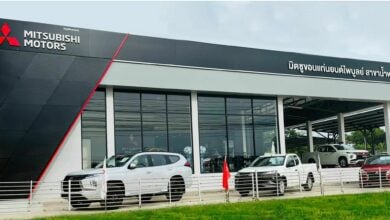Thailand drives automotive innovation with blockchain technology

Let’s dive into the exciting world of Thailand’s car industry, where something super cool is happening – blockchain technology is making waves and turning things up a notch. Imagine having a sneak peek into the future of cars and seeing how this tech is shaking things up, from making everything more open and easy to track to boosting how well everything works and keeping it all safe. We’re here to walk you through just how blockchain is transforming the Thai automotive scene, highlighting all the awesome ways it’s changing the game in areas like supply chain management and how companies connect with their customers.
Thailand is stepping up its game by embracing blockchain in its auto sector, showing us all that it’s on the cutting edge of creating a smarter, more sustainable future. By taking cues from how they’re tracking fish with blockchain to make sure everything’s above board and applying similar smarts to car-making processes, it’s clear Thailand is leading the charge towards an innovative tomorrow. We’re excited to unpack all there is about blockchain in this industry – looking at the big wins it brings to the table while also chatting about some hurdles along the way.
An in-depth analysis of blockchain applications within the automotive arena reveals how Thai companies are not only aligning with global trends but often surpassing them in their pursuit of innovation. Whether one is an industry specialist, a technology aficionado, or simply keen on discerning future interactions between automotive developments and blockchain technology, this article commits to furnishing readers with an exhaustive understanding of this subject matter.
Blockchain in Thailand’s automotive sector
The push towards digital transformation
In Thailand, the car-making scene is getting a cool upgrade with blockchain technology! It’s all about making things run smoother and keeping everything super secure. By embracing these digital changes, Thailand is zooming ahead, becoming a top spot for car innovation. The application of blockchain within the Thai automotive industry promotes transparent and efficient processes. From supply chain management to secure transactions, blockchain’s immutable ledger guarantees data integrity and fosters trust among stakeholders. As manufacturers and suppliers adopt this technology, there is a notable reduction in counterfeit parts, while consumers enjoy access to verifiable vehicle history. This transition signifies a wider shift towards digital transformation, encouraging other sectors to adopt similar advancements.
The role of government initiatives
The Government of Thailand’s forward-thinking approach towards blockchain technology has significantly accelerated its integration within the automotive industry. By implementing supportive regulations and launching initiatives, it has cultivated an environment that is favourable for blockchain-based innovations. Projects spearheaded by the government highlight the capability of blockchain technology to enhance public services while stimulating involvement from the private sector. These efforts not only exemplify the government’s dedication to economic modernization but also lay down a foundation for secure and efficient information exchange. Through nurturing an ecosystem conducive to blockchain development, Thailand positions its automotive sector to lead in technological progress, aptly prepared to address the requirements of the digital era.
Exploring blockchain applications in automotive manufacturing

Supply chain transparency and traceability
In Thailand’s automotive industry, blockchain applications revolutionize supply chain management. They introduce unmatched levels of transparency and traceability. By embedding blockchain technology into their operations, manufacturers can now monitor the movement of goods in real time. Each component’s journey, from production through to delivery, gets recorded on a tamper-proof digital ledger. This capability enhances the monitoring of automotive components, considerably diminishing the probability of logistical discrepancies. Furthermore, it assists in authenticating the genuineness of parts, confirming their compliance with the industry’s rigorous quality benchmarks. For enterprises, this signifies improved operational effectiveness; for end-users, it equates to assuredness in the reliability of their automobiles.
Combating counterfeiting with blockchain
The automotive scene in Thailand is hitting a bit of a bump due to the widespread of fake car parts. The implementation of blockchain technology presents a robust solution to this problem. By establishing an unalterable record for every transaction and movement of goods, manufacturers can verify the authenticity of parts at each stage of the supply chain. This approach not only impedes the manufacture and dissemination of counterfeit components but also ensures a secure process for recalling defective items. Furthermore, when integrated with Internet of Things (IoT) devices, blockchain facilitates immediate authentication and monitoring.
Blockchain for vehicle lifecycle management

In Thailand’s automotive sector, the integration of blockchain technology is transforming the management of vehicles throughout their lifecycle. This advanced method significantly improves security and transparency while simultaneously optimizing the entire vehicle management process.
Enhanced security for vehicle data
Blockchain technology markedly enhances the security of vehicle data. Through the utilization of a decentralized and tamper-proof ledger, blockchain guarantees that vehicle data, encompassing sensor information, software updates, and other essential diagnostics, are preserved securely. This unalterable method of record-keeping safeguards against unauthorized access and manipulation of data, assuring both manufacturers and vehicle owners. It stands as a formidable solution for upholding data integrity, which is vital for the progressively connected and autonomous vehicles being introduced on Thailand’s roads.
Ownership and service history tracking
The adoption of blockchain technology markedly improves the transparency and efficiency in monitoring a vehicle’s ownership and service history. Every transaction concerning the vehicle, be it sales, service records, or transfers of ownership, is precisely recorded on a blockchain. This process creates a transparent and immutable historical record of the vehicle, accessible to potential buyers, insurance firms, and service providers. It successfully eliminates the possibility of fraudulent service records or disputed ownership claims, thus enabling a more streamlined and trustworthy procedure for the transaction of vehicles.
Smart contracts and their impact on auto financing

Streamlining vehicle leasing and sales
Smart contracts on blockchain platforms offer an unprecedented level of efficiency in vehicle leasing and sales. These digital contracts automatically execute transactions when predefined conditions are met, eliminating the need for manual processing and reducing the risk of errors. For you, this means faster leasing or purchase transactions with the added benefit of clear, immutable records. Vehicle information, terms of sale, and payment details are encrypted on the blockchain, ensuring that all parties have access to consistent and accurate data. Additionally, smart contracts facilitate the quick release of funds, hastening the completion of sales and leases and improving your overall experience.
Facilitating secure, transparent transactions
In the world of Thai cars, blockchain technology is like a superhero making sure that money matters are safe and clear as crystal. The star of the show? Smart contracts! Imagine every deal being locked in, easy to check out, and tamper-proof. This cuts down on sneaky stuff big time. For folks buying cars and those footing the bill, it’s like a trusty handshake that says, “You can count on this deal.” These smart contracts keep track of everything, making sure each step of the deal is clear for everyone to see. This awesome level of safety and openness means everyone’s investment is snug as a bug, and it makes sure everyone plays fair. All in all, it makes the whole process of getting your dream car funded smooth sailing.
Overcoming challenges in blockchain adoption

Addressing technological barriers
Your journey into integrating blockchain applications within Thailand’s automotive industry may hit a technological snag. These barriers often stem from the nascent nature of blockchain technology, coupled with its complex requirements for integration into existing systems. To navigate these challenges, focus on fostering partnerships with blockchain development firms that have a proven track record in the automotive sector. This ensures access to the necessary expertise and technology tailored to your specific needs.
Legal and regulatory hurdles
Navigating the legal and regulatory landscape in Thailand can be daunting, especially given the innovative nature of blockchain technology. The first step is to gain a thorough understanding of existing regulations surrounding the use of blockchain within the automotive industry. This may require consulting with legal experts who specialise in blockchain technology to ensure your initiatives are compliant from the outset.
It’s also crucial to stay informed about any regulatory changes or new laws that could impact your blockchain projects. Engaging with policymakers and regulatory bodies can provide valuable insights and help shape future regulations in a way that supports innovation.
Prospects of blockchain in automotive innovation

The surge in blockchain applications within Thailand’s automotive sector points towards a transformative phase. Building on the groundwork laid by companies like Bridgestone and their advancements in supply chain management through blockchain, the horizon looks promising. The automotive industry is set for an evolutionary leap, as blockchain technology offers tailor-made solutions for several longstanding issues from transparency to security.
Firstly, expect an expansion in the use of blockchain for vehicle lifecycle management. By ensuring every vehicle’s history is securely recorded and easily accessible, blockchain stands to drastically reduce instances of fraud, improving consumer trust in the process. This technology enables a new level of detail and accuracy in tracking a vehicle’s life, from manufacturing to disposal.
Secondly, blockchain’s role in streamlining automotive finance and transactions is set to grow. The collaboration with KBank illustrated the potential for blockchain to enhance transaction efficiency while bolstering security. In the future, more financial institutions could adopt similar blockchain systems to facilitate smoother, more secure automotive transactions, benefitting both businesses and consumers.
As the summer heat intensifies, ensuring your car is well-maintained becomes crucial. From checking the air conditioning system to verifying fluid levels and tyre pressures, these essential car maintenance tips can prevent breakdowns, enhance performance, and provide a cooler, more reliable ride during the sweltering months.

































